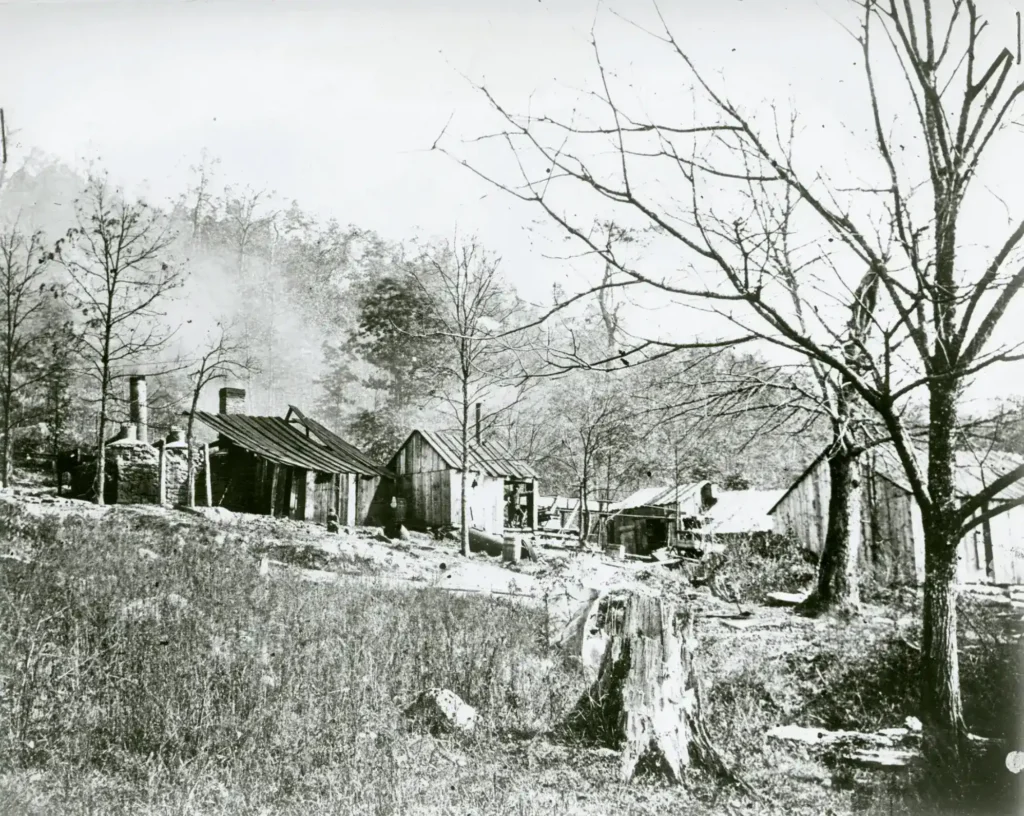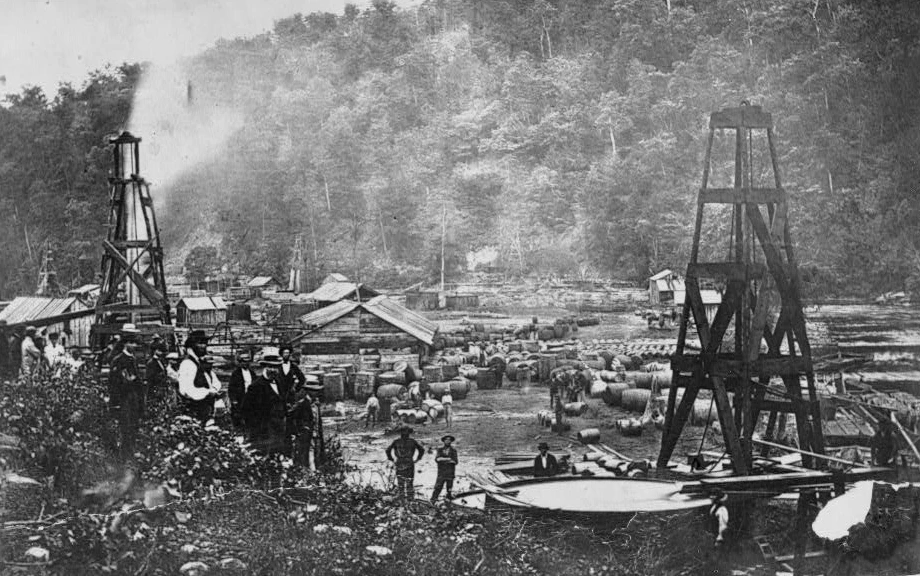
The Ups and Downs of a Petroleum Prince
Titusville Herald, December 10, 1870
A correspondent of the Cincinnati Commercial, writing from Oil City, gives the following interesting account of the career of Steele, known throughout the country a few years since as “Coal Oil Johnny.”
The Widow McClintock Farm: A Land of Untapped Wealth
Some four miles above the city, directly on the line of the Oil Creek and Allegheny River Railway, lies a tract once celebrated as the “Widow McClintock Farm.” There is now nothing to distinguish it particularly from other sections in the immediate vicinity, all being played out alike. But these are the barren acres formerly brought into prominence by the extravagance and dissipation of John W. Steele.

Here, for some years, ignorant of the boundless wealth beneath their feet, the McClintock’s in common with the other natives of that little-more-than-half-civilized region, plodded along day after day. Their sole care being the prospects of the buckwheat and bean crops, as the failure of either was almost certain to breed a famine.
No children came to cheer the solitude and eat the flapjacks of the worthy matron. Probably a wise dispensation of Providence, as the products of the farm were not extensive enough to fill many mouths with any degree of certainty. At last, however, as old age came creeping in their direction, thoughts regarding the disposal of their valuable property began to trouble them.
A Boy Becomes an Heir
The conclusion was at last reached to adopt some healthy boy and make him sole heir. A short distance from McClintock’s lived a man by the name of Steele. As the barrenness of the land has not extended to his wife, he found himself the father of a numerous progeny, and was often sorely puzzled about plans for keeping the wolf from the door.
To him due application was made. Without hesitation he gave them the pack of the flock, remarking that he had ten or twelve more to dispose of on the same terms. As the most promising one, “Johnny” was selected. Thereafter, he was trained up in the way he ought always to have gone.

The Oil Boom Changes Everything
In the fullness of time came the discovery of petroleum, and the accompanying army of seekers after the greasy fluid. One irruption after another swept across the McClintock farm, literally trampling out the expected harvest.
The McClintock Farm Under Siege
At the age of three-score-and-ten [70 years old], the old man [Culbertson McClintock] saw starvation staring him in the face. Besides this he was continually pestered by offers for the purchase of the old homestead, until finally his ancient body succumbed and he was gathered to his fathers.
[Ed.’s note: Culbertson’s age is grossly overestimated here. He might have looked ancient but Culbertson was only 45 years old at the time of his death. Sarah, the “old lady,” died nine years after him at the age of 50.]
Desperation Leads to Prosperity
For a long time the old lady refused to have anything to do with the outside barbarians. But at last, in sheer despair, she leased a portion of the farm, every part of which afterward proved wonderfully productive. Being forever ruined for agricultural purpose, the venerable widow now employed some household assistance. And spent her days in cording up bonds and greenbacks in the cellar, though she was afterward induced to purchased a safe, as being more secure.
A Tragic Mistake and a New Heir
In this pleasant pastime, she might have passed the remaining period of her useful life had she not attempted to make the fire burn one morning by pouring on it a bucketful of crude oil. In an incredibly short span of time she was in a country where petroleum is supposed to be unknown. From that date began the career of her heir, soon known far and wide as “Coal Oil Johnny.”

The Rise of ‘Coal Oil Johnny’
From Teamster to Heir
After the mortal remains of the old lady had cooled and been properly interred, Steele – who up to this time had been engaged in hauling oil – took $75,000 from the safe.
New Companions
With three or four fellow teamsters, he started out on a cruise into that outside world of which they had heard strange rumors. These companions were soon shaken off, however, and their places seized by a number of parasites, who clung to the young man as long as he had a penny left.
A Parade of Parasites: Enter Seth Slocum
Prominent among these was one Seth Slocum, who installed himself as “financial agent.” Afterwards, inseparable, the two then plunged into the wildest species of excess. Spending the greater portion of their time in Philadelphia and New York, one may hear there yet the stories of their extravagance and wild orgies. Doubtless many of these tales are exaggerated, but enough is known to mark Slocum down as a most successful swindler, and Steele as the most consummate fool of the present generation.
Extravagance in Action
The chief aim of the latter’s life appeared to be to literally throw away his fortune as rapidly as possible. He succeeded so well that he squandered nearly two million dollars in less than 12 months. His methods of doing this were very peculiar and perhaps original.
Lavish Spending and Public Displays
Gifts of $5,000 and $10,000 set diamonds to his male and female friends were matters of everyday occurrences. While to vary the monotony, he would sally into the street, purchase the finest barouche and span he could find, take a short ride, and give the turnout to the driver. Another favorite freak was to lease the hotels where he might be stopping, and allow none of the guests to pay bills during his administration. While his losses at fare were heavy and continued, John Morrissey’s bank having won $50,000 in one night.
Skiff & Gaylord’s Minstrel Troupe
But what, perhaps, gave him as much notoriety as anything else was the organization of a troupe of minstrels, Skiff & Gaylord’s, we believe, the sole condition being that portraits of himself as “financial agent” should adorn the posters and programs. He gave each member of the company a diamond pin and ring, a gold watch and chain. Together with a complete wardrobe, they started on their way rejoicing.
The Decline of Fortune
He purchased an interest in a large hotel in Meadville for $45,000, and getting a little hard up one day, sold it back for $10,000, while other property in and around the same place was bought and sold in about the same proportion. But, through the medium of this and other devices, success crowned his efforts. The wells gave out, and the bottom of the old safe was reached at last. The McClintock farm was sold to satisfy a little hotel bill of $32,000, incurred at the Girard House, Philadelphia, while enough other mortgages were placed on record to cover the old place a foot deep.

The Fall and Reinvention of ‘Coal Oil Johnny’
From Magnate to Minstrel Doorkeeper
Steele, “Coal Oil Johnny” no more, now disappeared for a season from the scenes of his triumphs, but some time afterward came to the surface in the position of doorkeeper for the minstrel troupe of which he was the founder.
A Humble Tavern Keeper
We next heard of him as endeavoring to keep a seven-by-nine tavern in Franklin, but he was not so successful as in his previous efforts to play Boniface. In the present instance he was willing to take pay from his patrons.
Greasy Contentment in the Old Neighborhood
At last, however, “Johnny” has found his level again. He may now be seen daily in the neighborhood of his old home guiding a pair of ancient equines attached to a dilapidated wagon. Sitting perched above his half-dozen barrels of oil he is a picture of greasy contentment. He obtains fifty cents her barrel, cash, and looks as though he had nothing more to ask for. Must not the man be happy who can so gracefully adapt himself to circumstances?
The Villain’s End: Seth Slocum’s Fate
It may be a source of satisfaction to some who read this sketch to learn that Slocum, who was responsible more than all others for Steele’s course, died in jail at Erie a year or two since, where he was incarcerated, being unable to obtain $100 bail.
[You can revisit Coal Oil Johnny’s early efforts on the McClintock farm in this post from a few days ago – Dec. 7, 1864: McClintock Farm Oil Investment. – Editor]
